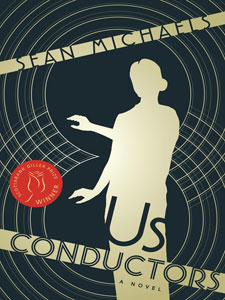Sean Michaels: Electric Atmosphere by Lucie Renaud
/ February 1, 2015
Version française...
 The Giller Prize certainly remains one of the most sought-after awards on the Canadian literary scene. If the jury recognized works from experienced authors like Alice Munro, Margaret Atwood, Michael Ondaatje, and Mordecai Richler over the years, the jury set its sights on Us Conductors this year. The novel is the first work by Mile End’s Sean Michaels. The Giller Prize certainly remains one of the most sought-after awards on the Canadian literary scene. If the jury recognized works from experienced authors like Alice Munro, Margaret Atwood, Michael Ondaatje, and Mordecai Richler over the years, the jury set its sights on Us Conductors this year. The novel is the first work by Mile End’s Sean Michaels.
Last November, jury members stated that “[Michaels] fulfilled one of the most difficult tasks as an author: he gave us the impression of singing music from a novel,” as they gave the speechless winner his prize.
Music is at the centre of Lev Sergeyevich Termen’s fictionalized biography. He invented the theremin, one of the most intriguing instruments ever to be designed: sounds are created without a performer touching one of the instrument’s antennae.
“I was listening to the radio in my car one evening—in 2008, I think,” Sean Michaels recalls. “I heard this wonderful song and an absolutely superb voice. When the selection ended, the host told us that we had just heard the theremin and nobody was singing. This changed my perspective on the instrument.”
Shortly after a friend referred to a documentary about the theremin and the relationship Termen had with Clara Rockmore, one of the greatest performers of all time, a story began to develop. The story of this encounter eventually connected to other stories the author recounted.
“I was especially interested in the idea of true love and other formal matters such as the concept of time and how its sluggishness could be juxtaposed with a kung-fu scene. I thought this story might allow me to incorporate each component,” Michaels says.
If Michaels read a number of biographical documents, he decided to distance himself from them from the start. “Deep inside, I think I’ll always be a fictional author,” he asserts.
Because the author is more interested in a plausible story instead of a true story, he worked more on atmospheres, whether it’s New York City’s hectic nightlife before the 1929 market crash or the Soviet gulag’s asceticism. “I wanted to understand emotion before sunset in one of these valleys. It’s not possible to do so from a book,” he adds.
In the same vein, Michaels sought to convey the specific mood of a listener as accurately as possible. “In one scene, the orchestra plays the gulag,” the author illustrates, “and I wanted this section to be subtle enough to not give readers the impression they were living a rosy Hollywood moment. I wanted this section to be more doubtful. I wasn’t actually writing a book to give the impression of being musical; I like prose, language, the singing images on the page.”
In addition, rhythm was cleverly measured. “I wanted the book to be misleading. I was particularly interested in a narrator not always telling the truth and trying to communicate a version of events,” says Michaels. “In a way, I desired to entice readers with a story of a crazy and exciting life interspersed with evenings uniting inventors and celebrities before taking them to Siberia. These are the hardest moments for the character.”
Founder of the Said the Gramophone blog, Michaels lives with music on a day-to-day basis. “I constantly listen to music, especially when I’m working. Many authors require silence, but I passionately want to hear music, even music with words. It can become white noise and extremely useful.” Although Michaels grew up with classical works (more specifically works by Bach and Rachmaninoff), the novel’s hidden soundtrack refers to the 1980s.
“Even though the story mostly takes place during the 1920s and 1930s, I wanted this story of love, confusion, and desire to have a more contemporary push from the outset,” the author points out. “I began to think about post-punk and new wave music, as well as groups like Cocteau Twins, Joy Division, and New Order—groups that incorporated electric sounds in their music.”
All chapters are given song titles from the 1980s. Catherine Leroux, an award-winning author of two novels, will adapt these titles in a French translation to be published in 2016.
Translation: Dwain Richardson
Version française... | 
